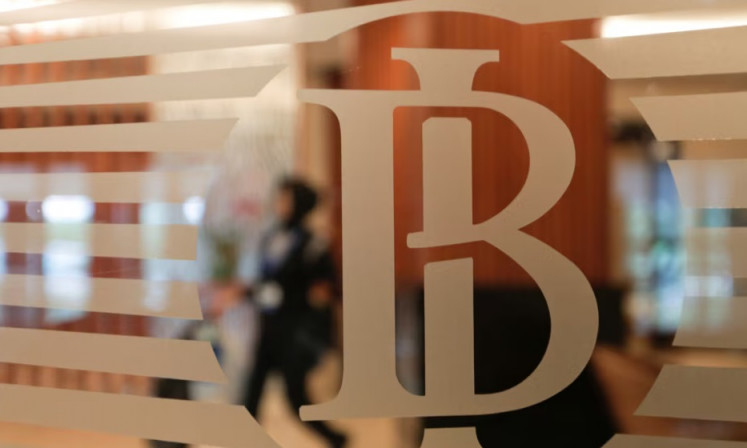Popular Reads
Top Results
Can't find what you're looking for?
View all search resultsPopular Reads
Top Results
Can't find what you're looking for?
View all search resultsRupiah consolidates as confidence builds
The rupiah accelerated rapidly in recent days with growing confidence in the Indonesian economy and speculators betting on the BI key rate staying steady
Change text size
Gift Premium Articles
to Anyone
T
he rupiah accelerated rapidly in recent days with growing confidence in the Indonesian economy and speculators betting on the BI key rate staying steady.
On Thursday the rupiah rose 0.1 percent to 9,225 against the dollar as of 3:15 p.m. in Jakarta, from 9,235 on Wednesday, Bloomberg reported. It touched 9,208, its strongest level since September 2008.
Acting Bank Indonesia (BI) Governor Darmin Nasution said Thursday the rupiah strengthened due to large capital inflows in the past two or three days. “I think the market tried to predict that we would keep our policy rate. So they entered the country before [the rate decision].”
The central bank said it would support the rupiah if needed. “As long as it is still in an acceptable range, we will let it be,” Darmin said on Wednesday.
Indonesia’s foreign exchange reserves stood at US$66.11 billion as of Dec. 31, 2009.
Mandiri Sekuritas chief economist Destry Damayanti said the rupiah will fundamentally appreciate in 2010.
“There are two factors: Domestically, our economy still has a large momentum of growth; globally, although the US economy has begun recovery, uncertainties remain high,” Destry said.
She added the dollar also weakened as investors put more money into commodities.
BI maintained its policy rate at 6.5 percent for the fifth straight month on Wednesday, saying there would be no inflationary pressures in the first half this year.
The government said it would delay an increase in electricity base tariffs, but gave no timing.
Analysts said the government’s move changed the 2010 inflation outlook. BI estimates that 2010 inflation will be between 4 and 6 percent, while it rose by just 2.78 percent in 2009 from 2008.
Sebastien Barbe, a Hong Kong-based strategist at Calyon was quoted by Bloomberg as saying “BI’s decision not to raise rates yet is also good for the economy as it helps to boost investment.”
The currency will strengthen to 9,050 by June and trade between 9,000 and 9,400 this year, Barbe predicted. Foreign investors bought $184 million more Indonesian stocks than they sold on the first three days of the week, adding to net purchases of $1.4 billion in 2009.
“The odds are rising of there being no rate hikes at all this year,” said Helmi Arman, a Bank Danamon economist.
Low BI rate may encourage banks to set lower lending rates, which will ease borrowing costs for businesses to expand and spur economic growth.
The Finance Ministry estimated the economy grew by 4.3 to 4.4 percent last year, predicting a rise to 5.5 percent in 2010.
Destry predicted the rupiah would reach 8,927 to the dollar by the end of this year, with an average rate of 9,100 throughout 2010.
She warned that a too-sharp strengthening of the rupiah could hurt exports.
“But 9,200 [to the dollar] is not yet dangerous, it [the trend] is still in line with our peer group,” she said.
Bloomberg reported that India’s currency, the South Korean won and the Philippine peso were also traded near their strongest levels in at least 15 months on Thursday.
The rupee gained 0.5 percent rising to 45.63 as of 2:56 p.m. in Mumbai and rose as much as 0.7 percent to 45.56. The won climbed 0.1 percent to 1,135.35 per dollar in Seoul, having earlier touched a 15-month high of 1,129.42. The Philippine peso advanced 0.4 percent to 45.845.










